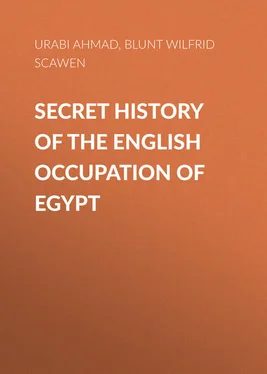Wilfrid Blunt - Secret History of the English Occupation of Egypt
Здесь есть возможность читать онлайн «Wilfrid Blunt - Secret History of the English Occupation of Egypt» — ознакомительный отрывок электронной книги совершенно бесплатно, а после прочтения отрывка купить полную версию. В некоторых случаях можно слушать аудио, скачать через торрент в формате fb2 и присутствует краткое содержание. Жанр: foreign_antique, foreign_prose, Историческая проза, на английском языке. Описание произведения, (предисловие) а так же отзывы посетителей доступны на портале библиотеки ЛибКат.
- Название:Secret History of the English Occupation of Egypt
- Автор:
- Жанр:
- Год:неизвестен
- ISBN:нет данных
- Рейтинг книги:4 / 5. Голосов: 1
-
Избранное:Добавить в избранное
- Отзывы:
-
Ваша оценка:
- 80
- 1
- 2
- 3
- 4
- 5
Secret History of the English Occupation of Egypt: краткое содержание, описание и аннотация
Предлагаем к чтению аннотацию, описание, краткое содержание или предисловие (зависит от того, что написал сам автор книги «Secret History of the English Occupation of Egypt»). Если вы не нашли необходимую информацию о книге — напишите в комментариях, мы постараемся отыскать её.
Secret History of the English Occupation of Egypt — читать онлайн ознакомительный отрывок
Ниже представлен текст книги, разбитый по страницам. Система сохранения места последней прочитанной страницы, позволяет с удобством читать онлайн бесплатно книгу «Secret History of the English Occupation of Egypt», без необходимости каждый раз заново искать на чём Вы остановились. Поставьте закладку, и сможете в любой момент перейти на страницу, на которой закончили чтение.
Интервал:
Закладка:
At Cairo, where I arrived a few days later, I found much change, and all, as it seemed to me, for the better. The old irresponsible tyranny of Ismaïl had given place to the comparatively mild régime of the Anglo-French Condominium . The finances had been regularized, and order put into most of the Administrations. I visited some of the same villages I had known in such terrible straits five years before, and found that the worst evils affecting their position had been put a stop to, and, though still poor and highly-taxed, there was no longer that feeling of despair among the fellahin which had made them pour out the history of their woes to me when I had first come among them as a sympathetic stranger. I went to the British Agency, and was delighted to find established there as Consul-General my friend Malet, who gave me a roseate account of the reforms that had been effected or were in project, for as yet little had been actually done except financially. All was going slowly but steadily on the road of improvement, and the only clouds he could see on the horizon were, first, in the Soudan, which was so great a drain upon Egypt's resources, and, secondly, in the Army, where there had been latterly symptoms of discontent. He spoke much in praise of the new Khedive, Tewfik, and took me to see him at the Palace, and I found him, if not very interesting, at least holding the language of a civilized and liberal-minded Prince. An echo of Malet's optimism may be recognized in my letters from Egypt of that date, and I find the draft of one I wrote to Hamilton of which the following is an extract:
"I find a great change here for the better since five years ago, and, whatever may be the shortcomings the late Government may have to answer for elsewhere, their policy in Egypt certainly was a success. The country people now look fat and prosperous, and the few I have talked to, people who in former years complained bitterly of their condition, now praise the Khedive and his administration. They seem, for once, to have gone the right way to work here, making as few changes as possible in the system of government and only taking care that the men who caused the disorder should be changed. It was a great stroke of policy getting rid of Ismaïl, and I feel little doubt that with proper management the present man will go straight. Egypt is so rich and such a cheap country to govern that its finances must come right, if it limits its ambition to its own natural prosperity. But there are one or two rocks ahead, the government of the Soudan for instance, which will always be an expense and will always be an excuse for maintaining an army. I cannot conceive why Egypt should charge itself with governing the Nile beyond the First Cataract, its old boundary. Putting down the slave-trade in Africa is an amusement only rich countries need afford themselves. It will also be a great misfortune if such protection and supervision as the Government gets from England should be withdrawn, at least for some years and until a new generation has grown up used to a better order of things than the old. I should like immensely to see Syria put under another such régime . That, too, if there is no attempt to hold the desert, is a fairly rich country and might be made to pay its way. But it would require a very distinct protection from Europe to relieve it of the cost of an army. For police purposes a very small force would be sufficient, and I am convinced that people in England exaggerate immensely the difficulty of keeping the peace between the mixed Mohammedan and Christian populations there. These have all lain groaning together so long under the same tyranny that the edges of their prejudices have got worn down."
With regard to my plan of seeking Mohammedan instruction, I was from the outset singularly fortunate. Rogers Bey, a distinguished Eastern scholar whom I had known some years before as Consul at Damascus, was now an official of the Finance Office at Cairo, and from him I obtained the name of a young Alem connected with the Azhar University, Sheykh Mohammed Khalil, who came to me daily to give me lessons in Arabic, and stayed to talk with me often through the afternoons. It happened, however, that he was far more than a mere professor of the language of the Koran. Mohammed Khalil, of all the Mohammedans I have known, was perhaps the most single-minded and sincere and at the same time the most enthusiastic Moslem of the larger and purer school of thought such as that which was being expounded at that time at Cairo by his great master, Sheykh Mohammed Abdu. I like to think of him as he then was, a young man of about thirty, serious, intelligent, and good, without affectation, pious and proud of his religion, but without the smallest taint of Pharisaism or doctrinal intolerance or of that arrogant reserve which is so common with Mohammedans in dealing with persons not of their own faith. He was all the contrary to this. From almost the first day of our intercourse he made it his duty and his pleasure to teach me all he knew. His school of interpretation was of the very widest kind. He accepted as true creeds all those that professed the unity of God; and Judaism and Christianity were to him only imperfect and corrupted forms of the one true religion of Abraham and Noah. He would hear nothing of intolerance, nothing of bitterness between believers so near akin. The intolerance and the bitterness were the evil legacy of ancient wars, and he believed the world to be progressing towards a state of social perfection where arms would be laid down and a universal brotherhood proclaimed between the nations and the creeds. As he unfolded to me these ideas and based them on texts and traditions, declaring them to be the true teaching of Islam, it may be imagined how astonished and delighted I was – for they were very close to my own – and the more so when he affirmed that they were the views beginning to be held by all the more intelligent of the younger generation of students at his own university, as well as elsewhere in the Mohammedan world. He gave me, too, an account of how this school of enlightened interpretation had sprung up almost within his own recollection at the Azhar.
The true originator of the Liberal religious Reform movement among the Ulema of Cairo was, strangely enough, neither an Arab, nor an Egyptian, nor an Ottoman, but a certain wild man of genius, Sheykh Jemal-ed-din Afghani, whose sole experience of the world before he came to Egypt had been that of Central Asia. An Afghan by birth, he had received his religious education at Bokhara, and in that remote region, and apparently without coming in contact with any teacher from the more civilized centres of Mohammedan thought, he had evolved from his own study and reflection the ideas which are now associated with his name. Hitherto all movements of religious reform in Sunnite Islam had followed the lines not of development, but of retrogression. There had been a vast number of preachers, especially in the last 200 years, who had taught that the decay of Islam as a power in the world was due to its followers having forsaken the ancient ways of simplicity and the severe observance of the law as understood in the early ages of the faith. On the other hand, reformers there had been of a modern type recently, both in Turkey and Egypt, who had Europeanized the administration for political purposes, but these had introduced their changes as it were by violence, through decrees and approvals obtained by force from the unwilling Ulema, and with no serious attempt to reconcile them with the law of the Koran and the traditions. The political reforms had been always imposed from above, not suggested from below, and had generally been condemned by respectable opinion. Jemal-ed-din's originality consisted in this, that he sought to convert the religious intellect of the countries where he preached to the necessity of reconsidering the whole Islamic position, and, instead of clinging to the past, of making an onward intellectual movement in harmony with modern knowledge. His intimate acquaintance with the Koran and the traditions enabled him to show that, if rightly interpreted and checked the one by the other, the law of Islam was capable of the most liberal developments and that hardly any beneficial change was in reality opposed to it.
Читать дальшеИнтервал:
Закладка:
Похожие книги на «Secret History of the English Occupation of Egypt»
Представляем Вашему вниманию похожие книги на «Secret History of the English Occupation of Egypt» списком для выбора. Мы отобрали схожую по названию и смыслу литературу в надежде предоставить читателям больше вариантов отыскать новые, интересные, ещё непрочитанные произведения.
Обсуждение, отзывы о книге «Secret History of the English Occupation of Egypt» и просто собственные мнения читателей. Оставьте ваши комментарии, напишите, что Вы думаете о произведении, его смысле или главных героях. Укажите что конкретно понравилось, а что нет, и почему Вы так считаете.












